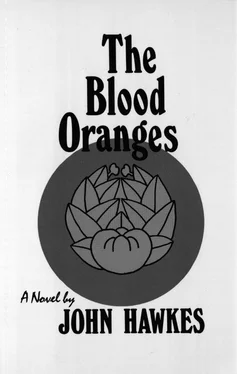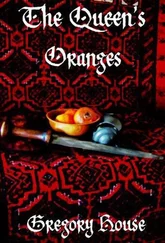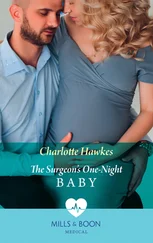And then the nemesis of our brief respose became exactly the unpredictable display of cause and effect that I had anticipated, and Catherine struck away Hugh’s desperate hand, Hugh jumped to his feet. Fiona caught Hugh’s nearest thigh in her already waiting arms and squeezed slowly and yet for only an instant. There was no need to look and reassure myself that behind us Hugh was lapsing again into arrogance, was standing with his eyes shut, his stump upraised, his thin bare legs rigidly apart, his fingers driven into Fiona’s hair even while Fiona’s eager cheek lay pressed to his thigh. Would he never learn? I adjusted the faded strap of the halter, pushed my warm face into Catherine’s face and clothed her suddenly naked mouth with mine.
“Look, baby. A little goat!”
But was it possible? Had I heard her bright words correctly? Had Fiona actually spoken somewhere outside the no doubt pedestrian aura of the muttered sounds of contentment I must have been making while kissing Catherine? Was it dream, change, coincidence, or was my state of mind a menagerie of desire from which real animals might spring? Could it be that one of my speechless creatures of joy and sentiment had torn itself loose from the tapestry that only I could see? Was it now bearing down upon us with blue eyes and the wind in its hair? Was the little goat that had danced among us in my mind now going to leave its little hoofprints in the center of Fiona’s blanket or come rushing and butting between our legs? It did not seem possible. But of course it was.
“Oh, baby, look, he’s wonderful!”
We separated, climbed to our feet, stood apart, all four of us, and together stared in the direction indicated by Fiona’s outstretched arm and waving hand. And of course Fiona’s excitement was justified and the goat was real. But he was not white, as I had thought, but cream-colored, a small long-legged creamy animal splashed on the forelegs and masked around his eyes with brown. At first glance he was in the air, hung suspended at the height of his second leap from the gloomy pines, and even from where we stood we could see his bright blue eyes and the nubile horns embedded in soft down. At least I had been right about the color of his eyes, I thought, and smiled.
Then he sprang, leapt, danced his soaring stiff-legged dance. And while Hugh romped with the goat and I squatted beside the distasteful Eveline, comforting her and helping her climb back into the discarded pants, I glanced up and saw that Meredith had stripped off her modest trunks and halter at last and with both thin arms raised above her head was leaping up and down in the black water. She had kept her back to us and now her thin body was slick and brown, her little white porcelain buttocks were winking at me through the sheaves of spray.
“Meredith,” Catherine called over her shoulder, “come look at the baby goat.”
But their oldest daughter danced on and it occurred to me that after all there was hope for Meredith and even for Hugh. And Fiona was still sharing my thoughts because suddenly there she was, kneeling where I squatted with the child, and Fiona’s whisper was filled with pleasure, confidence, elation, the smell of jasmine.
“Isn’t he wonderful? I want him for my own, I really do.”
“Goat or man?”
“The man, baby. The man.”
LAST NIGHT (ONLY LAST NIGHT) I LAY UNACCOUNTABLY awake on my narrow iron bed in my small vaulted room and listened to Rosella snoring in the darkness at the other end of the villa. I was amused at the sound and in passing decided that it could only be the latent old peasant woman already snoring inside Rosella and that the sound was no doubt comforting to their partially domesticated animals. But what of myself? Why was I, who was always a heavy sleeper, now lying awake?
Slowly I raised my arms and clasped my large dry weathered hands behind my head. I had not been dreaming, there was no wind in the cypresses, the noises from Rosella’s little open mouth were distant, faint, and could not have awakened me. Why then my open eyes, my slow ordered speculations? What had become of my ponderous capacity for peaceful sleep? After all, I thought then with amusement and mild nostalgia, Fiona used to resort to little kicks and punches to wake me out of total darkness, used to thrust a lighted cigarette between my still sleeping lips, used to tug at my hair and pound my chest, in mock fury fight my pajama buttons before I managed to open my eyes and speak a few thick golden words of reassurance and with my own fingers pull what she used to call the rip cord of my pajama bottoms. How different I was from Fiona, how different I was from Hugh who claimed that he spent all the nights of his life in sleepless writhing.
The bedstead trembled, I could hear its rust flaking onto the stone floor. At that moment I knew that even if I raised myself on one elbow and glanced at the window I would not be able to distinguish the blackness of the funeral cypresses from the blackness of the night. Lying in the very darkness in which Hugh and Fiona had suffered both together and separately, I admitted to myself that even while laving my memories of them in silent thought I could not blame my wakefulness on Fiona’s long leaps through the night or on Hugh’s torment. But was it even a question of blame? I thought not. And suddenly I knew with a kind of certainty that whatever in fact accounted for my wakefulness it was somehow pleasant — immediate, obvious, pleasant. Something had happened, something had changed, and I knew that in the thick neutral night of my middle age I had only to think, to wait another few moments in order to know why I was awake in this darkness of measured expectancy.
I listened, I concentrated all my receptivity on the nearly invisible crude contours of my low stone vaulted ceiling. Beyond the wall of funeral cypresses the black inhospitable sea was unaccountably silent. Out there beyond the other darkened villa my pair of little owls was sleeping. My solid bed was just large enough for one, its lumpy mildewed mattress was a denial of love, my weight was extracting some kind of faint lonely music from its rows of archaic rusty springs. And then I realized that I had lain awake once before in exactly this same state of suspended lucidity. Rarely a dreamer, blind forever to the possibilities of insomnia, nonethless I had somewhere, sometime spent another night lying awake in the presence of some unidentifiable delight. But where? When? The narrow bed, the springs, my unrumpled pajamas, the absence of sheet or blanket — all these, I thought, were clues.
In the darkness I made fish lips, frowned. Why was I, with my memory, my self-understanding, my ability to expose the logic sewn into the seams of almost all of our precious sequences of love and friendship, now at a loss to locate two separate but similar sources of warmth, surprise, pleasure? What bed could I be trying to recall? What night?
The marriage bed, of course, the couch of love, the first formal gift of conjugal darkness. For a moment I felt a sensation of relief and shades of triumph, and told myself once more that Psyche was on my side and that given time and thought I could always count on myself for answers. At least I was now recalling exactly what I had been attempting to recall: the sight of the mid-thigh silver wedding dress, the white stockings, the hot medicinal taste of the brandy I drank rather foolishly perhaps from her silver shoe, the late moment when finally I unzipped the metallic dress and helped her strip off the stockings and then carried her nude to the edge of the warm dark fountain amidst the appreciative sounds of our most loyal friends.
Don’t bother being a husband, baby. Just be a sex-singer. OK ?
Were those her words, her magic words? Again I heard them, again the stark ceremonial details returned, though lying there in the center of my night of analytical revery, I was amused to realize that as a matter of fact I could not remember the last time I had thought about this occasion, the exact identification of which would remain forever buried on the inside surface of the ring that served as its reminder. Then why now?
Читать дальше












